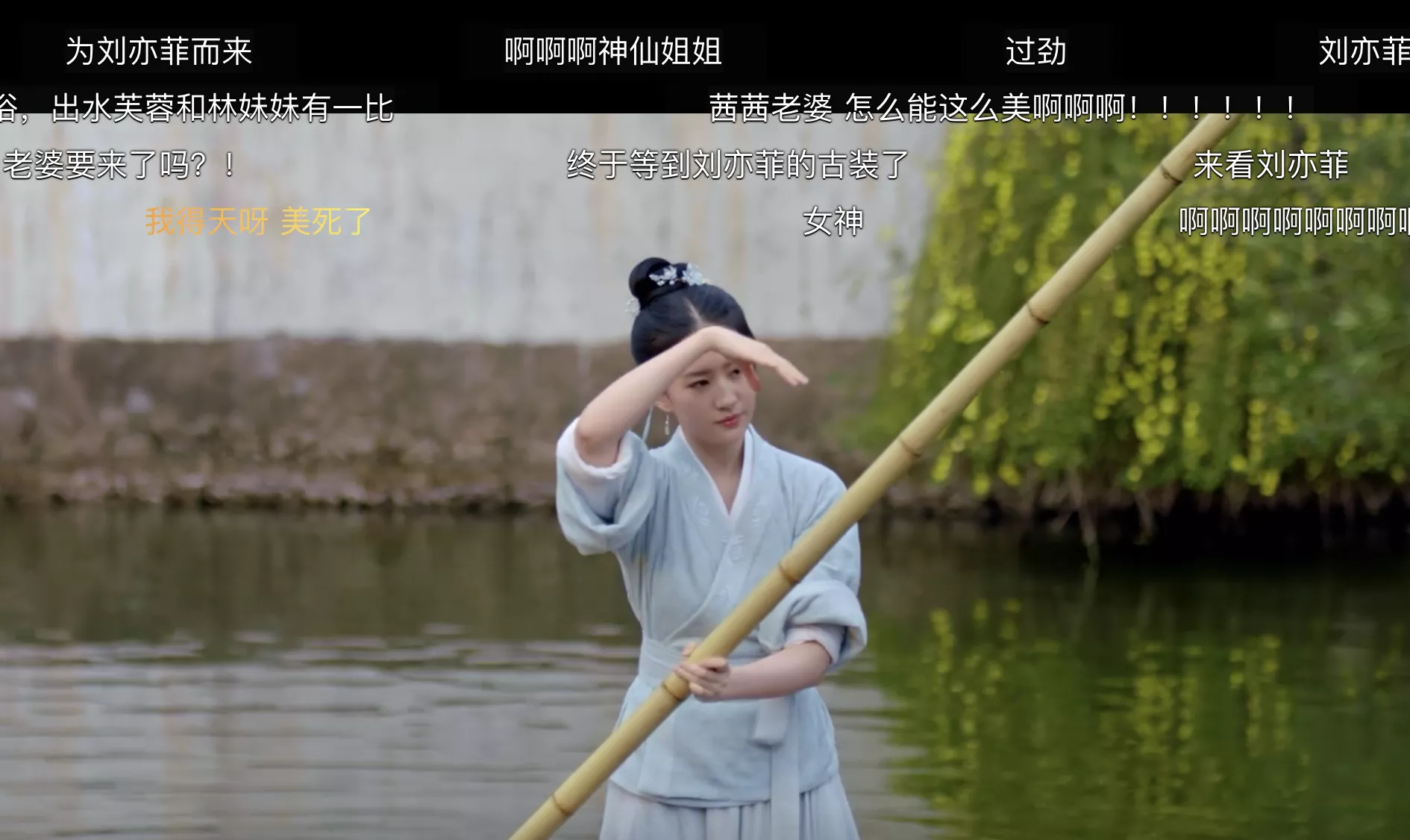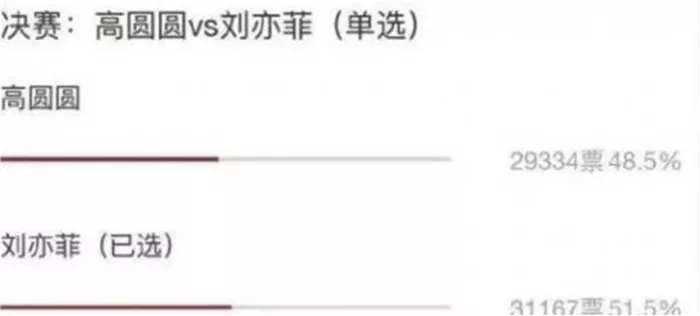In the expectation of a group of post-80s and post-90s, Liu Yifei appeared. In 6 minutes and 21 seconds, she was dressed in light blue and padded a raft slowly on the Qiantang Creek. A handful of flowers in the bow of the boat and a reflection of the stream are about the same as "a beautiful woman in a flower boat will stay in spring for a long time."

Picture source: Meng Hua Lu
On the evening of June 2, 16 years later, Liu Yifei's TV play "Meng Hua Lu" premiered again. A group of fans who went into the pit from 2002 to 2006 because of Liu Yifei's "golden powder aristocratic family", "Tianlong Babu", "Legend of swordsman" and "Shendiao Xialv" fell into a carnival.
You can feel the emotional excitement from the barrage that night:
"For the immortal sister."
"For my aunt."
"Zhaoling'er ten years ago, zhaopan'er ten years later."
"My wife finally plays a new play."
"From far to far, the Philippines is the most beautiful."
For Liuyifei, the Jianghu has changed. The last time she appeared in a TV play was when there was no bullet screen. At that time, post bar, QQ group and forum were important distribution centers for her fans.
However, there has always been a legend about her in the Jianghu. In the "tiger fluttering goddess" competition (walking street goddess competition), Liu Yifei was one of the most dominant players in history. She, Gao Yuanyuan, jiajingwen, qiushuzhen and Tong Liya have locked in the top eight for a long time, and 2019 is a historical victory for Liu Yifei's "straight male fans": in the final, Liu Yifei "beat" Gao Yuanyuan with a small number of votes and finally won the championship**
It is worth noting that Liu Yifei is the only "tiger fluttering goddess" who reappeared in the Jianghu in recent years with the title of "great lady of ancient costume drama". And her performance of "Meng Hua Lu" is also quite emotional: This is a "Song drama", adapted from the yuan Guanhanqing's "song theme" drama "Zhao Pan'er's wind and moon save the wind and dust", and "song learning" is a prominent learning in the domestic short video circle, publishing circle and knowledge payment circle in the past five years.
"The country's ethos has gone back to the ancient times, and the popularity of the Song Dynasty has affected the consumption circle from the academic circle." In March of this year, a person in charge of product research and development of a consumer company told huolf that since the "Song wind dance" and "only this green" became popular on New Year's Eve in 2022, "Song wind fever" has continued to rise. "In recent years, the books, paintings and even IP of Su Shi, Huang Tingjian, Li Qingzhao, song Huizong and others have a high flow effect, which is a national cultural sentiment."
What excites some of Liu Yifei's fans is that on June 3, the third episode of sister 3 (hereinafter referred to as "sister 3") will be updated. A fan of Liuyifei, who was born in 1987, told Hu Xiang that he watched eight episodes of Meng Hua Lu at one go on the night of June 2, slept for a few hours, and then watched sister Lang 3 on time at noon on June 3.

The fan said that from 2004 to 2006, as a high school student, his daily happiness came from going home to watch Liu Yifei's martial arts drama at night and listening to Jay Chou, Jolin Tsai, wangxinling and other music.
What surprised him was that today, about 16 years later, he seemed to "go back to the past": his happiness after work was watching Liu Yifei's costume drama, Wang Xinling's variety show and Jay Chou's video Number concert.
The brand has already seen the potential business opportunities. In the patch advertisement of "Meng Hua Lu", coke is among them; Earlier, Wang Xinling, who gained high popularity with sister Lang 3, won the endorsement of "Golden Classics".
A brand personage from a consumer goods company said that actresses in the 30-45 age group are in a special business cycle, "They rose in the era of traffic centralization, leaving a deep impression on the hearts of the post-80s and post-90s. However, the new generation of 18-25-year-old female stars rising in the era of focus traffic has not established a centralized advantage. Without the support of the rice circle economy and the investment model, the transformation effectiveness of the new generation of female stars has decreased significantly. In addition, in terms of business prices, female stars in the 30-40 age group are very cost-effective, resulting in the emotional economy around female stars in the 30-45 age group after the epidemic Significant warming. "
Behind the "IP" of Liuyifei and wangxinling
The final of the tiger fluttering goddess competition in 2019 will be still fresh in the memory of some Liu Yifei fans. At the most intimate moment, the difference in their vote rate was only 2.3% At that time, Gao Yuanyuan had achieved three consecutive Asian competitions since 2016, and she lost to jiajingwen, qiushuzhen and tongliya respectively

The war between the two men was very close. Picture source: Tiger pounce
Liu Yifei and Gao Yuanyuan have similarities in their rise. They both have a history: participating in martial arts dramas from 2002 to 2006. It was an era when martial arts dramas were created with the greatest star power. Even the popularity of jiajingwen and qiushuzhen could not be separated from the blessing of martial arts dramas.
Unlike today's brokerage companies, which try their best to play Tiktok, live broadcast and open little red books, the "works" and the channels of the works from 2002 to 2006 determine the flow value of an artist. At that time, Jin Yong's martial arts dramas were often premiered by CCTV and other television stations. In the era of underdeveloped network, these dramas were equivalent to the drainage tools of "centralized traffic platform".
The real rise of Liuyifei was from 2004 to 2005. In the two years, her "Legend of immortal swords and heroes" and "divine carving heroes" were released one after another, which made her popularity soar.
It was also in 2004 that Wang Xinling released the album "love you", and the main song "love you" quickly became popular. At that time, Wang Xinling probably didn't realize that 18 years later, she became famous again with a 45 second love you.
Like Liu Yifei, the music world in 2004 is also a world that relies heavily on "works and channels" After signing Aihui, the company pushed Wang Xinling to participate in almost all the singing and singing programs, and it was in 2004 that Wang Xinling starred in "the wedding dress of heaven"
It is worth noting that in 2004, Liu Yifei and Wang Xinling were both in their early stage of debut. If we turn the camera to the present, it is not difficult to see the changes in today's artist development model: if we take four years as stages to see the local artists who have made their debut since 2018, it is almost difficult to say a national music or a national play they have participated in.
Two factors are hidden behind this: the disappearance of domestic centralized traffic platforms and the lack of good works in the field of music and movies. But there is a subtle relationship between the two. In 2020, a senior musician (who had in-depth communication with lixiuman, founder of SM Entertainment in Korea) told me that after the emergence of more fragmented user groups, it is almost impossible for creators to polish "national" works.
"Destined to enter the focus era and the minority era." This person gave an example. At that time, "super giant" returned from South Korea polished an album at his own expense. The musicians invited were the best in North America. The dance design team spent a lot of money from South Korea to polish it. This super giant is convinced that his album will subvert the Chinese music world, but what embarrasses him and his team is that after the release of the album, he can't even reach the top ten on QQ music and Netease platform.
The team is under great pressure. They try to find out why "high-quality" content can not become "national works". They found a third-party research company and went to Hangzhou, Shanghai and Shenzhen to specially visit young people aged 18-25 years old. it was found that this album full of "Korean wave flavor" was described as "noisy", "uncomfortable" and "like Korean songs" by quite a few young people**
In a sense, Liuyifei and wangxinling "profited" from the era of traffic centralization. And their luck is that the "content" and "culture" characteristics of their works are more popular.
For the "old fans" of Liuyifei and wangxinling, their attitude towards Korean wave is complex. For most of the post-85 and early 1990's, Korean wave is unavoidable: most of them were in high school and college, facing the years when Korean dramas and Korean troupes were "piled up" on the screen, and in the decade 2006-2016, Korean wave content and Korean fan communities rapidly expanded their territory around microblogs and other media.
This is not only the Korean Wave era in culture. From 2006 to 2016, Korean cosmetics, Korean coffee and Korean clothing brands opened a golden age in the Chinese market, which constituted a "Korean current synergy": the cultural products of Korean dramas and Korean troupes quickly brought flow support to Korean goods, and finally formed a two-way influx of culture and goods.
However, compared with the rising model of Liu Yifei and Wang Xinling, the expansion of Korean wave in the Chinese market is slightly different: due to language differences, cultural barriers and content restrictions, Korean wave content is difficult to go deep into the "capillaries" like the legend of the legendary swordsman and love you.
In short, it does not have the same effect of "tap water like cultural expansion", but requires key groups to promote it in a targeted way - and eventually evolved into a rice circle. Powerful fans control the fan group from the organizational and financial aspects. Korean cultural products quickly affect the targeted crowd by influencing fans.
Korean production companies tried to further strengthen their cultural output - they began to train Chinese artists, with Korean music and Korean dance as the core From 2010 to 2016, this model combined with "fan Quan fan tou" and evolved into a Korean fever
But the essence of the problem is that it can not find cultural roots in this land. For example, the vast majority of Chinese people will not use "black and white" Spring Festival couplets for the Spring Festival, as Koreans do; Moreover, Korean wave works deeply influenced by American pop culture (such as more English in music and more sexy and bold in dance) are not easy to be popular in China's more sinking world. In short, what the Chinese market needs is works rooted in Chinese culture. And the brainwashed "rice circle powder head" model is not suitable here.
Some things have not changed. If you "cross" to Bianjing of the Northern Song Dynasty in 1033, you can see the "idols" at the "GouLan tile roofed cottage" and experience the "popularity" at that time. The singers will sing the words written by scholars and scholars. However, in the streets of Bianliang city in 1033, you will probably hear "no alternative but to spend and return from the familiar Yan." In Bianliang City, there will also be Korean artists, who are famous for their exotic dances, but they are still a minority. And those who can become famous all over the world often rely on popular works - those words with national attributes, or the latest masterpiece of top class creators, such as Su Shi, the top class "net celebrity" of the Northern Song Dynasty.
At present, for those companies that still want to "make stars", what they need to do is to shift their attention from traffic to the works themselves - not works with Korean wave gene or Japanese wind gene, but high-quality works rooted in Chinese local culture.
A key detail worthy of their "understanding" is that in 2020, when Su Shi's exhibition appeared in the Forbidden City, it was hard to get a ticket in the Forbidden City. A large number of generation Z and post-00s, dressed in Han costumes or quadratic costumes of different shapes, poured into the Forbidden City, hoping to "rub" the heat of the top stream of the Northern Song Dynasty. What can keep Su Shi popular is not only feelings, but also selfie.